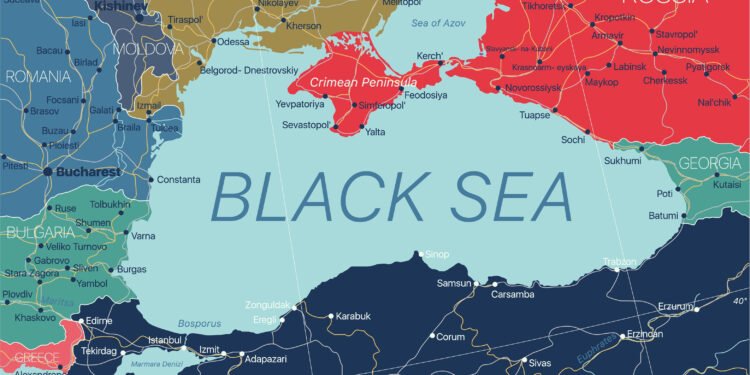Greece (Brussels Morning) Turkey, Romania, and Bulgaria are about to formally sign a cooperative agreement to remove mines from the Black Sea, which are left over from the Ukrainian conflict. Yasar Guler, the minister of defense for Turkey, declared that the agreement would soon be signed after these NATO members had long talks. The idea started with a conference in April 2022 between representatives from Georgia, Poland, and Ukraine and the Black Sea states of Turkey, Romania, and Bulgaria to discuss the problem of floating mines left over after Russia invaded Ukraine.
The three nations’ defense ministers discussed the concept in further detail during NATO summits in Brussels in October and Ankara last month as they worked to complete the cooperative endeavor. Minister Guler stressed that Turkey, Romania, and Bulgaria would be the only countries involved in the “Trilateral Initiative” at first and that their defense ministers were organizing an official signing ceremony in Istanbul on January 11.
Guler clarified that the mines were a result of the fighting between Russia and Ukraine and that they occasionally broke loose and drifted in the direction of Turkey’s straits. Mine-clearing ships from the participating countries will continue to patrol up to Romania’s maritime borders to reduce this risk.
A concurrent development was the announcement by Britain that it would be donating two minehunter ships from the Royal Navy to the Ukrainian Navy as part of a new maritime defense alliance with Norway aimed at strengthening Ukraine’s maritime capabilities.
Beyond the drive to clean the Black Sea of mines, Turkey is actively pursuing diplomatic opportunities with the UN, Ukraine, and Russia to bring back the Black Sea grain program, which was started by Moscow but was shelved earlier this year. While the status of these negotiations is still unknown, Turkey continues its diversified strategy for regional cooperation and stability while keeping cordial ties with both Moscow and Kyiv.
The New East Med
Throughout classical times, the Black Sea region has functioned as a hub for international trade and business, serving as both a melting pot and a pivotal location for cultural interchange. From a geostrategic perspective, it played a crucial role as the end point of the Silk Road and a global crossroads. Additionally, the Bosporus and Dardanelles, for centuries, have been among the most significant maritime passages worldwide.
Turkey appears to be leading the two states in matters of high strategy in the region and their utilization. Neither of the other two countries has presented a plan of strategic security capacity, which will be able to utilize their military capabilities in addition to commercial ones. After the Russian invasion of Ukraine, what are the military advantages that the two countries obtained compared to before, taking advantage of the crisis in the region? A crisis creates opportunities, opportunities beyond grain and gas, open ports, and adventurous stops. The high strategy concerns the utilization of far-reaching plans that unfold smoothly through geopolitical developments.
The problem is even bigger if we include Moscow’s supporters in Romania (less) and Bulgaria (more).
Despite Bulgaria’s membership in NATO and the EU, factions within its governing coalition with pro-Moscow leanings have aimed to hinder meaningful support to Ukraine, albeit quietly supplying arms to the country. These elements have also worked to maintain Bulgaria’s reliance on Russian oil and gas, even in the face of Russia abruptly halting gas exports to Bulgaria in the spring of 2022. Bulgarian politics continue to be volatile, with a substantial portion of the civilian population cautiously favoring Russia. However, the invasion of Ukraine has unsettled this sentiment.
Romania, with a 245-km Black Sea coastline and a $285 billion GDP, actively addresses Russian aggression in the region within NATO since 2014. As a frontline state near Sevastopol, it faces Russian air and maritime forces, relying on NATO security guarantees despite a $6 billion defense budget. Romania’s military assets include a modest navy, an army with 400 tanks, and ongoing modernization efforts, such as F-16s, Patriot systems, HIMARS launchers, and unmanned aerial vehicles. The US Aegis system enhances defenses at the Romanian air base, and NATO contributes air patrols for Romanian airspace security.
We understand that Romania perceives the danger militarily but not politically, while Bulgaria moves better diplomatically but lags militarily. The only worse-off country of the two in the region, with no natural port to the Black Sea, is Moldova, which is not energy- and economically self-sufficient, has only a 6000-strong army, and is politically incapable of playing any meaningful role in the area. Its recent upgrade to the EU may offer another dynamic in the future.




